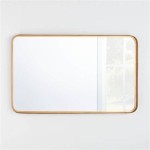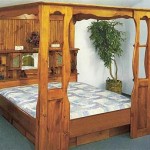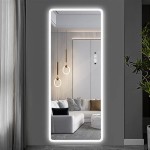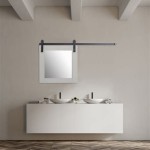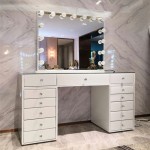Glass Framed Mirrors
Glass framed mirrors offer a sleek and sophisticated aesthetic, enhancing various interior design styles. Their reflective surfaces amplify natural light and create an illusion of spaciousness, making them a popular choice for both residential and commercial spaces. Understanding the different types, materials, and considerations involved can help individuals select the ideal glass framed mirror for their needs.
Types of Glass Framed Mirrors
Several frame styles are available, each contributing a distinct character to the mirror. Popular choices include minimalist metal frames crafted from materials like aluminum or stainless steel, offering a modern and clean look. Wooden frames provide a warmer, more traditional feel, with options ranging from rustic reclaimed wood to intricately carved designs. For a touch of opulence, ornate frames featuring intricate details and embellishments can create a focal point within a room.
Mirror Glass Quality and Thickness
The quality and thickness of the mirror glass itself play a significant role in the overall aesthetic and functionality. High-quality mirror glass offers a distortion-free reflection, crucial for accurate self-image viewing. Thicker glass is generally more durable and less prone to warping or breaking, particularly in larger mirrors. Standard mirror glass thickness typically ranges from 3mm to 6mm, with thicker options available for specific applications.
Frame Materials and Finishes
A wide variety of materials and finishes are utilized in the construction of glass framed mirrors. Metal frames are often powder-coated for durability and resistance to corrosion, while wooden frames can be painted, stained, or lacquered to achieve desired aesthetics and protect the wood. The chosen finish should complement the surrounding décor and contribute to the overall design scheme. Considering environmental factors such as humidity is also important when selecting frame materials and finishes.
Size and Shape Considerations
Glass framed mirrors are available in a vast array of sizes and shapes, allowing for flexibility in design and placement. Large, rectangular mirrors can create a statement piece above a fireplace or console table, while smaller, circular or oval mirrors can add a decorative touch to a wall grouping or vanity. The size and shape should be proportional to the surrounding space and furniture, creating a balanced and harmonious composition.
Installation Methods and Safety
Proper installation is essential for the safety and longevity of a glass framed mirror. Depending on the size and weight of the mirror, various installation methods may be employed, including D-rings, wire hangers, or specialized mounting hardware. It's crucial to ensure that the wall can support the weight of the mirror and that the chosen installation method provides a secure and stable attachment. Consulting a professional installer is recommended for larger or heavier mirrors.
Maintenance and Cleaning
Regular cleaning is important to maintain the clarity and brilliance of a glass framed mirror. Using a gentle glass cleaner and a soft, lint-free cloth is typically sufficient for removing dust and fingerprints. Avoid using abrasive cleaners or materials that can scratch the glass or damage the frame. Regularly inspecting the frame for signs of wear or damage and addressing any issues promptly can extend the lifespan of the mirror.
Choosing the Right Glass Framed Mirror
Selecting the appropriate glass framed mirror involves considering several factors, including the existing décor, the purpose of the mirror, and the desired aesthetic. Evaluating the size and shape of the space where the mirror will be placed is crucial for achieving a balanced and visually appealing result. The frame material and finish should complement the surrounding furniture and décor, creating a cohesive and harmonious design scheme. Prioritizing quality materials and construction ensures the longevity and durability of the investment.
Placement and Functionality
Consider the intended functionality of the mirror when choosing its placement. In bathrooms, mirrors typically serve a practical purpose for grooming and personal care, while in living rooms or hallways, they can be used to create an illusion of spaciousness and reflect natural light. Strategic placement can enhance the overall ambiance of a room, adding depth and visual interest. Understanding the functional requirements can guide the selection process and ensure the mirror serves its intended purpose effectively.

Firstime Co Black Pricilla Glass Framed Wall Mirror Modern Rectangular 24 X 2 35 75 In Com

Glass Framed Mirror 80cm X 60cm Mirrors Exclusive

Glass Framed Mirror Mitred Corners 80cm X 60cm Mirrors Exclusive

Glass Framed Mirror 80 X 60cm Decorexi A World Of Interiors

Antique Framed Mirror Wall With Antiqued Glass

Buy 30 X24 Multi Colored And Gold Luxe Mosaic Glass Mirror Decorshore

Newton Glass Framed Mirror 6 Sizes Soraya Interiors

Livingandhome Gold Arch Shatter Proof Glass Framed Mirror 80x180cm Diy At B Q

Yearn Framed Mirror Light Grey Dunelm

Tempered Glass Framed Mexican Tiled Mirror For Living


